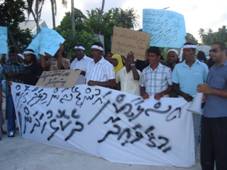An Israeli agricultural delegation from Teshuva Agricultural Products that was supposed to arrive on Filadhoo cancelled the visit after the islanders warned that they would not let the delegation go further than the jetty.
Island Council Member Mohamed Vijan today told Minivan News that almost all the citizens of the island were at the beach on Saturday to stop the Israel delegation from entering the island.
‘’But they never arrived, and no one informed the council that day that the visit has been cancelled,’’ Vijan said.
He said now the island was calm and everything was “as usual”.
‘’We have heard nothing from the Atoll Council or any other institution about the Israel delegation,’’ he added.
On its website Teshuva claims its advanced agricultural methods “allow for fresh culinary herbs to be grown in soil-less hydroponic systems.”
Former President Maumoon Abdul Gayoom’s new political party, the Progressive Party of Maldives (PPM), meanwhile issued a press statement thanking the islanders of Filadhoo for protesting against the Israeli agricultural delegation.
In the statement, the PPM said that the Filadhoo islanders have “shown the feelings of the Maldivian people at a time when the Palestinians are trying to pull themselves up by their own bootstraps.”
The PPM went on to claim that the relationship established with the Middle East during Gayoom’s reign was now crumbling “due to the foreign policy of the current government”.
The religious Adhaalath Party meanwhile called on other islands to follow the example of Filadhoo and block the delegation from visiting any other island in the Maldives.
In the statement Adhaalath Party said that although the government has claimed the Maldives would stand shoulder-to-shoulder with Palestine at the UN, the government was “an ally of Israel”, and that even if the Maldives voted in favor of Palestinian statehood “that will be done out of the embarrassment they would face if they did not.”

